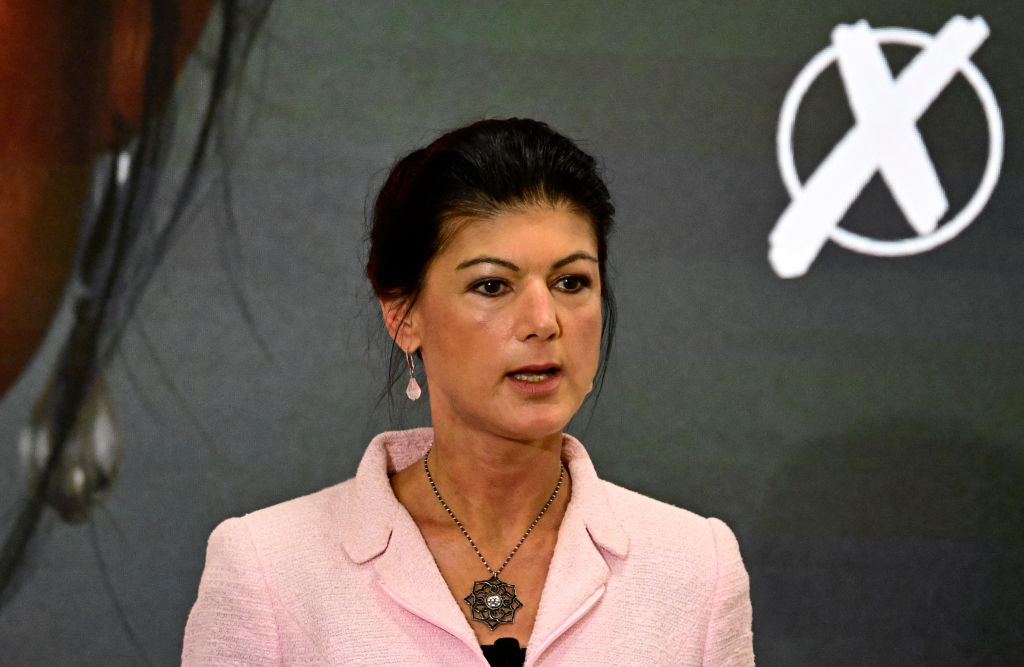Not everything about the European Parliament makes sense, but at least its layout is logical. The Left-wing parties sit on the far-Left of the hemicycle, followed by the social democrats, the greens, the liberals, the centre-right, the national conservatives and finally — on the opposite wing — the populist Right.
So in place of 100-plus parties from 27 nations, there’s the manageability of seven political groups. No wonder the EU incentivises the system with special funding and procedural privileges.
However, it’s now under threat from two quarters. Firstly, there’s the surge in support for the Right — which could upset the balance of power between the political groups. The second threat comes from Germany’s Sahra Wagenknecht — a dissident Leftist who now has her own political party, Bündnis Sahra Wagenknecht (BSW). According to a Europe Elects report by Tobias Gerhart Schminke, a like-minded group at the European level is also a possibility. But what would it stand for?
On economics and international relations, the Wagenknecht formula is pretty much in line with the conventional Left. But on culture war issues, she stands apart — especially on immigration.
Wagenknecht understands that you can have generous welfarism or you can have open borders, but not both. Another thing she gets right is that you can’t challenge the neoliberal order without mobilising the working class — and that won’t happen if the Left prioritises bourgeois liberalism over patriotic solidarity. The big thing she gets wrong, however, is Russia. Vladimir Putin’s expansionist mafia state may be the enemy of Wagenknecht’s enemies, but that doesn’t mean he’s anyone’s friend. Putin must be defeated — or at least contained — and until the Western Left comes up with a better idea for achieving that than Nato, then it should avoid pontificating on foreign policy.
Fortunately for Wagenknecht, she’s not alone in her positions. There are various other Left-leaning but politically incorrect parties across Europe. To form an official group in the European Parliament, they’d collectively require 23 MEPs from seven different countries.
Is that feasible? Schminke thinks so, pointing to potential members such as Jean-Luc Mélenchon’s La France Insoumise and the Slovakian Smer party. The most intriguing suggestion is Italy’s Five Star Movement. Initially, this was a “big-tent” populist party. However, when it lost its Right-wing supporters to Matteo Salvini and then Giorgia Meloni, Five Star repositioned itself on the Left, while maintaining its anti-establishment stance.
How times change. Between 2014 and 2017, Five Star’s main partner in the European Parliament was none other than Nigel Farage (when he was leading Ukip). But ever since that marriage of convenience came to grief, the Italian populists have been politically homeless. A new alliance with Wagenknecht’s party could bring them out of the cold.
For the EU establishment, the threat is that many of the most unclubbable — and, some would say, unpleasant — political parties in Europe could join forces. Such a grouping would upset the traditional Left-to-Right organisation of the parliament, while introducing a wildcard to an institution which is all about careful stitch-ups. Above all, it would present the voting public with a genuinely new — and disruptive — direction in Europe.
Perhaps instead of a hemicycle, the parliament could be arranged in a circle — with the Wagenknecht group sitting between Left and Right, but in opposition to the liberal centre.











Join the discussion
Join like minded readers that support our journalism by becoming a paid subscriber
To join the discussion in the comments, become a paid subscriber.
Join like minded readers that support our journalism, read unlimited articles and enjoy other subscriber-only benefits.
Subscribe